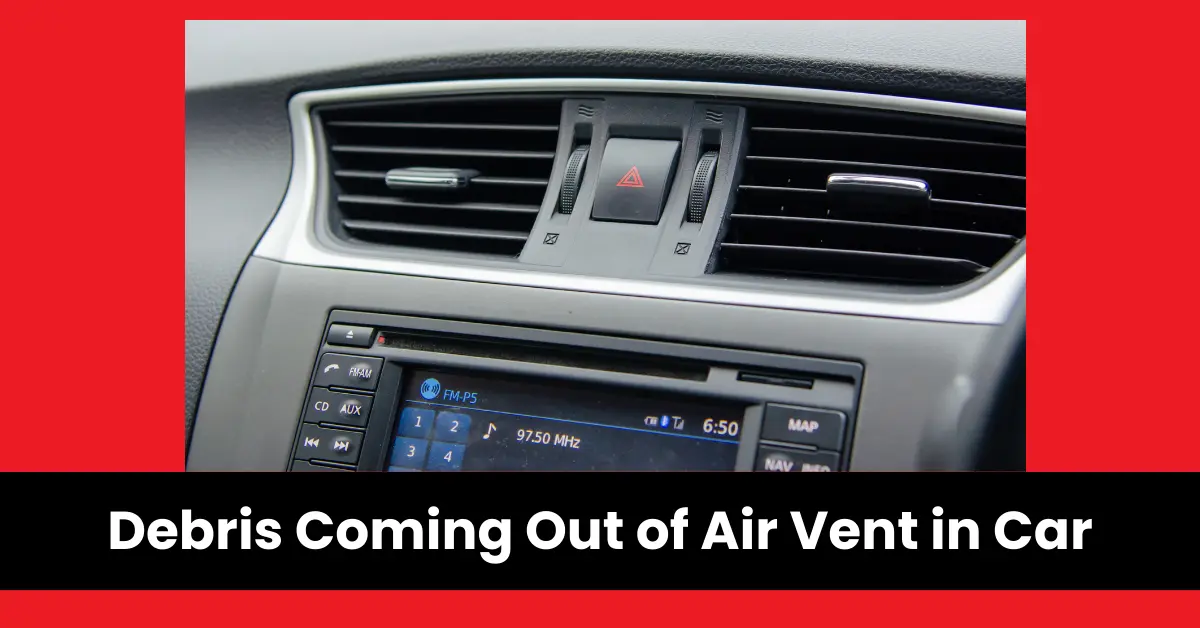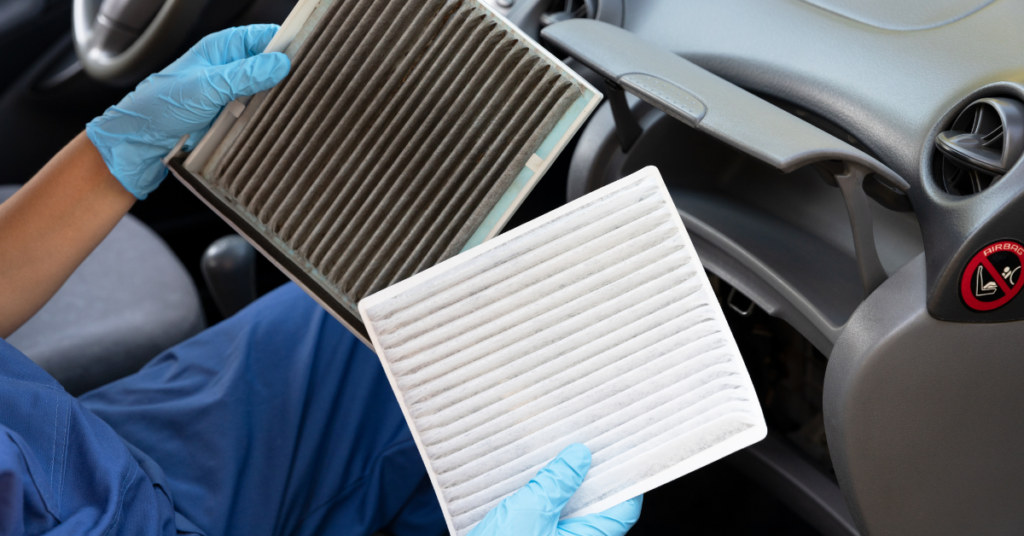
Dealing with debris coming out of air vent in car can be frustrating and potentially harmful to both the vehicle’s occupants and the overall functionality of the ventilation system.
It is essential to address this issue promptly to ensure a comfortable and safe driving experience.
In this article, we will explore the causes of debris in car air vents and provide effective solutions to prevent and resolve this problem.
Contents
Causes of Debris Coming Out of Air Vent in Car
Several factors can contribute to the presence of debris in car air vents. Understanding these causes is crucial in implementing the appropriate preventive measures. Here are some common reasons why debris may accumulate in your car’s ventilation system:
Dust and Dirt
Dust and dirt particles are a natural part of the environment, and they can easily find their way into the air vents of your car. Over time, these particles accumulate and can be blown out into the cabin when the ventilation system is in use.
Regularly cleaning the interior of your vehicle, including vacuuming the floors and wiping surfaces, can significantly reduce the amount of dust and dirt that enters the ventilation system.
Additionally, using a high-quality cabin air filter can help trap these particles and prevent them from reaching the vents.
Leaves and Tree Pollen
If you regularly park your car under trees, leaves and tree pollen can find their way into the air intake system of your vehicle. This can lead to clogged vents and a higher probability of debris being blown out.
To prevent this, try to park your car away from trees whenever possible. If parking under trees is unavoidable, consider using a car cover to minimize the build-up of debris.
Regularly inspecting and cleaning the air intake system can also help remove any leaves or pollen that may have entered.
Insects and Small Animals
Insects, such as ants or spiders, and small animals like mice or birds, can enter the ventilation system through openings or gaps. These organisms can build nests or leave behind debris that may eventually be blown out of the air vents.
To prevent this, regularly inspect the exterior of your vehicle for any openings or gaps that pests may use to enter the ventilation system. Seal these openings with appropriate materials to prevent insects or small animals from entering and causing debris accumulation.
Mold and Mildew
Moisture accumulation within the ventilation system can create an ideal environment for the growth of mold and mildew. These microorganisms can release spores and particles into the air, which may be expelled through the vents.
To prevent mold and mildew growth, it is important to keep your car’s interior dry and well-ventilated. Avoid leaving windows or sunroofs open during rain or humid weather.
Regularly inspect and clean the air vents and replace the cabin air filter according to the manufacturer’s guidelines to ensure optimal airflow and minimize the chances of mold and mildew development.
Preventive Measures to Avoid Debris in Car Air Vents
Taking proactive steps to prevent debris from entering your car’s air vents can save you from potential headaches and costly repairs. Here are some preventive measures you can implement:
Regularly Clean and Maintain Your Vehicle
Keeping your car clean, both inside and out, can significantly reduce the chances of debris accumulation. Regularly vacuuming the interior and wiping surfaces will help minimize the amount of dust and dirt that can find its way into the ventilation system.
Additionally, consider using interior car cleaning products that help repel dust and dirt, providing an extra layer of protection for your vents.
Park Away from Trees
Whenever possible, try to park your car away from trees to prevent leaves and tree pollen from contaminating the air intake system. If parking under trees is unavoidable, consider using a car cover to minimize the build-up of debris.
Regularly inspect and clean the air intake system to remove any leaves or pollen that may have entered.
Inspect and Seal Openings
Regularly inspect the exterior of your vehicle for any openings or gaps that pests may use to enter the ventilation system. Seal these openings with appropriate materials to prevent insects or small animals from entering and causing debris accumulation.
Additionally, consider using mesh screens or filters over external air intake openings to further prevent debris from entering.
Replace Cabin Air Filters

Cabin air filters play a crucial role in maintaining air quality inside your vehicle. These filters trap debris and help prevent it from entering the ventilation system.
Regularly checking and replacing cabin air filters according to the manufacturer’s guidelines will ensure optimal performance and minimize debris-related issues.
Consider using high-quality filters that have a higher efficiency in trapping smaller particles, such as dust and pollen.
Resolving Debris in Car Air Vents
If you are already experiencing debris coming out of your car’s air vents, you can take the following steps to resolve the issue:
Inspect and Clean the Air Vents
Begin by visually inspecting the air vents for any visible debris or blockages. Use a small brush or a vacuum cleaner with a narrow attachment to carefully clean the vents.
This can help remove loose debris and improve airflow. Additionally, consider using compressed air or a can of air duster to blow out any remaining debris.
Check and Clean the Cabin Air Filter
Remove and inspect the cabin air filter for any signs of debris build-up or damage. If the filter is dirty or clogged, replace it with a new one. Proper airflow through a clean filter will help prevent debris from reaching the vents.
Consult your vehicle’s manual for specific instructions on how to access and replace the cabin air filter.
Professional Inspection and Cleaning
If the issue persists or you suspect mold or mildew growth within the ventilation system, it is advisable to seek professional assistance.
Trained technicians can conduct a thorough inspection, clean the system, and address any underlying issues that may be causing the debris to be blown out.
They may use specialized cleaning solutions and tools to remove mold, mildew, and other debris effectively.
Remember, a well-maintained ventilation system not only keeps the air inside your car clean and fresh but also ensures the longevity and efficiency of your vehicle’s heating and cooling systems.
By implementing preventive measures and promptly addressing debris-related issues, you can enhance your driving experience and maintain a healthy environment inside your car.
FAQs
What are the common causes of debris in car air vents?
Several factors can contribute to the presence of debris in car air vents. Common causes include dust and dirt, leaves and tree pollen, insects and small animals, and mold and mildew. Regular cleaning and maintenance can help prevent these issues.
How can I prevent debris from entering my car’s air vents?
To prevent debris from entering your car’s air vents, you can take preventive measures such as regularly cleaning and maintaining your vehicle, parking away from trees, inspecting and sealing openings, and replacing cabin air filters according to the manufacturer’s guidelines.
What should I do if debris is already coming out of my car’s air vents?
If you are already experiencing debris coming out of your car’s air vents, you can inspect and clean the air vents, check and clean the cabin air filter, and seek professional inspection and cleaning if the issue persists or if there is mold or mildew growth.
Why is it important to address debris in car air vents?
Addressing debris in car air vents is important for a comfortable and safe driving experience. Debris can be harmful to both the vehicle’s occupants and the overall functionality of the ventilation system.
Taking prompt action can help maintain air quality, prevent further damage, and ensure the longevity and efficiency of your vehicle’s heating and cooling systems.



